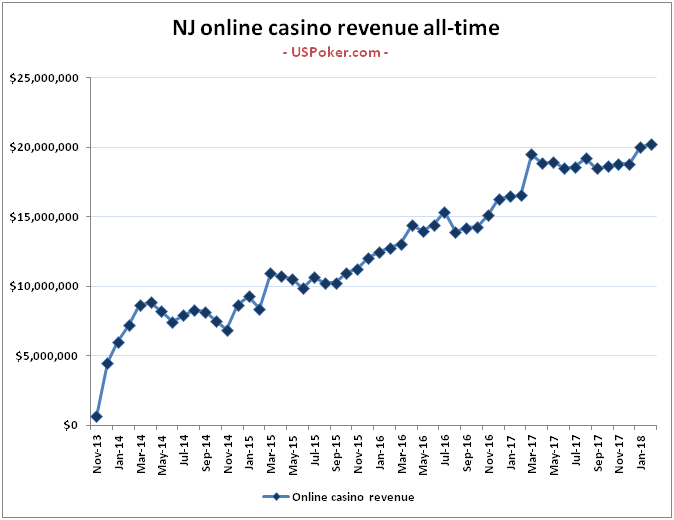After a sluggish start, the New Jersey online casino industry has turned into a revenue-generating machine. From 2014 to 2017 revenue has doubled, from $123 million to $246 million.
The sustained growth has been nothing short of remarkable, with year-over-year growth every single month, and with New Jersey online casinos tallying nearly a quarter of billion dollars in gross gaming revenue in 2017, and on pace for even more in 2018.
But not everything is hunky dory. Growth on the casino side of the ledger has masked the struggles of online poker.
The difference between the two couldn’t be more striking.


Other than seasonal trends, online casino revenue has been steadily rising as the market continues to mature.
On the other hand, online poker emerged fully mature and has been deteriorating ever since.
The five best months in New Jersey online poker history were its first five months:
- December 2013: $2,884,917
- January 2014: $3,442,271
- February 2014: $3,109,203
- March 2014: $3,210,663
- April 2014: $2,591,839
And aside from a short burst following the entry of PokerStars in the Spring of 2016, online poker has been unable to crack the $2.5 million mark.
New Players Get A Free Bonus At partypoker NJ
-
 Visit Party Poker
Visit Party Poker- $25 No Deposit
100% up to $1,000 With Deposit
- Party Poker ReviewOverall Grade B+
- Games B+
- Support C+
- Banking A
- Player Value A
Making sense of it all
There is a logical explanation for online poker’s strong early numbers and subsequent decline.
On April 15, 2011, US online poker players had the rug yanked out from underneath them. That was the day (dubbed Black Friday in the poker world) the US government shutdown the three largest US-facing online poker operators, leaving poker players with a ragtag group of unregulated offshore sites to choose from.
When New Jersey launched its legal online poker sites in November 2013 these players were still engaged and waiting for the return of online poker.
Simply put, online poker players were better aware of legal online gaming coming to New Jersey than potential online casino customers.
However, these players were summarily disappointed with the new legal sites. Players complained about inferior products, technical glitches, new regulatory hoops they had to jump through, and most of all, a lack of liquidity.
They were expecting pre-Black Friday online poker with tens of thousands of players and million-dollar Sunday tournaments. What they got was hundreds of players and $50,000 Sunday tournaments.
Needless to say, online poker quickly fizzled out in New Jersey.
PokerStars offered the early dropouts a glimmer of hope when it launched in the Spring of 2016, but with the liquidity constraints still in place it wasn’t long before the players that thought PokerStars would be different than other New Jersey operators moved on.
That said, the early numbers and the short PokerStars’ surge signal that there are more online poker players in the market.
Nevada will help
Online poker’s struggles can be traced back to one thing: liquidity, or a lack thereof.
New Jersey is expected to start pooling online poker players with Nevada and Delaware before the World Series of Poker begins in a couple months.
Joining the interstate online poker pool will help, but don’t expect miracles. Online poker traffic in Nevada traffic is less than New Jersey, and Delaware only brings a negligible number of online poker players to the table.
Furthermore, WSOP.com Nevada (WSOP.com is the only operator active in all three states) is chock full of solid players. That means new players drawn to the site by the increased traffic will find tough games, which will lead to a high attrition rate.
Interstate pooling with Nevada and Delaware should help bring monthly online poker revenue in New Jersey back over the $2 million mark, but not much higher.
Pennsylvania will help more
New Jersey won’t start to reach its online poker potential until Pennsylvania pools its online poker players with the three other states.
Here’s why:
- Pennsylvania’s population is equal to Nevada, Delaware, and New Jersey combined.
- Pennsylvania will have a better mix of casual and serious players.
- With Pennsylvania, legal US poker sites will boast similar traffic numbers as the remaining offshore operators. That could be tipping point that brings many of the players still playing on unregulated sites into the legal market.
The post Online Poker Struggles To Gain A Foothold In The Legal New Jersey Market appeared first on .
